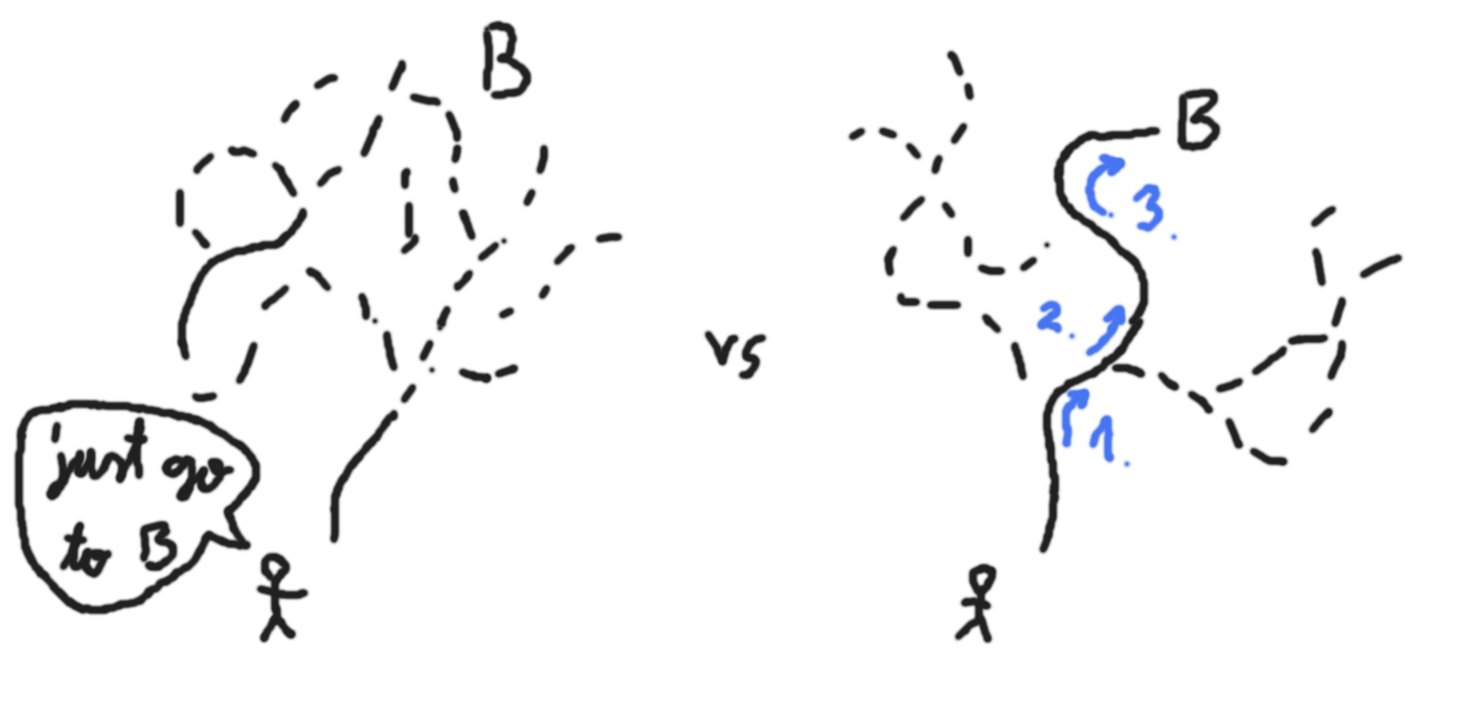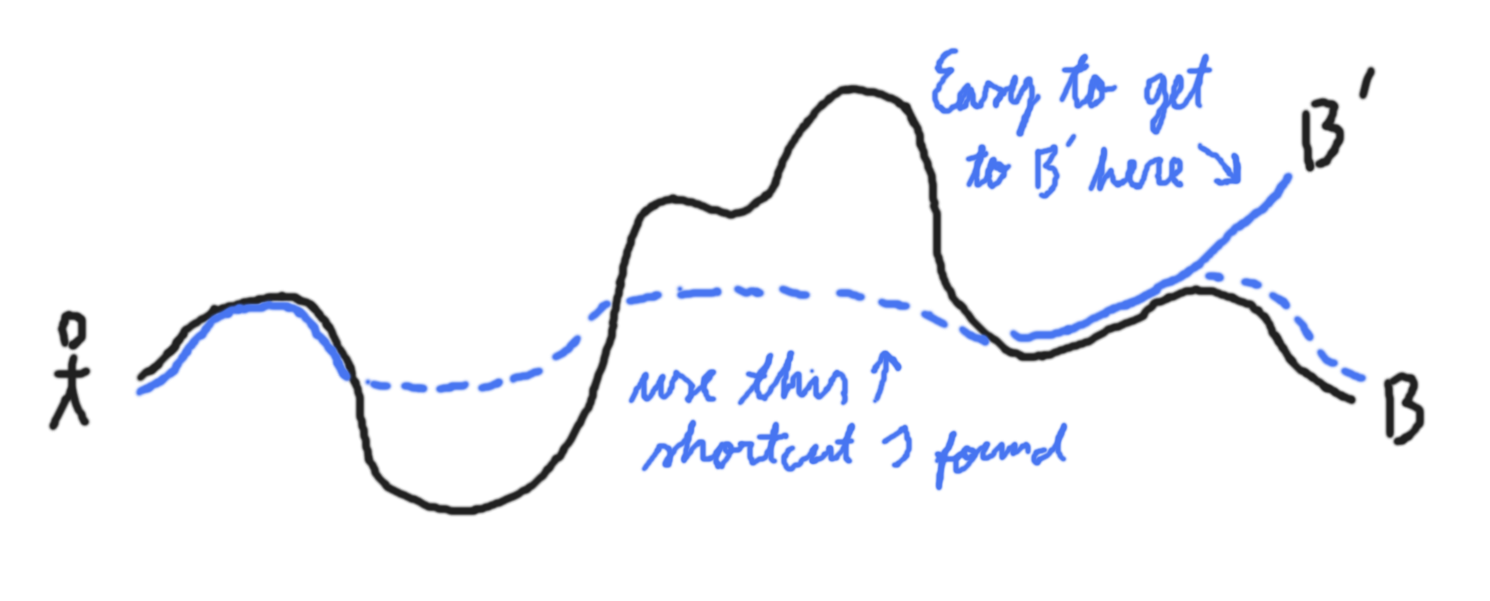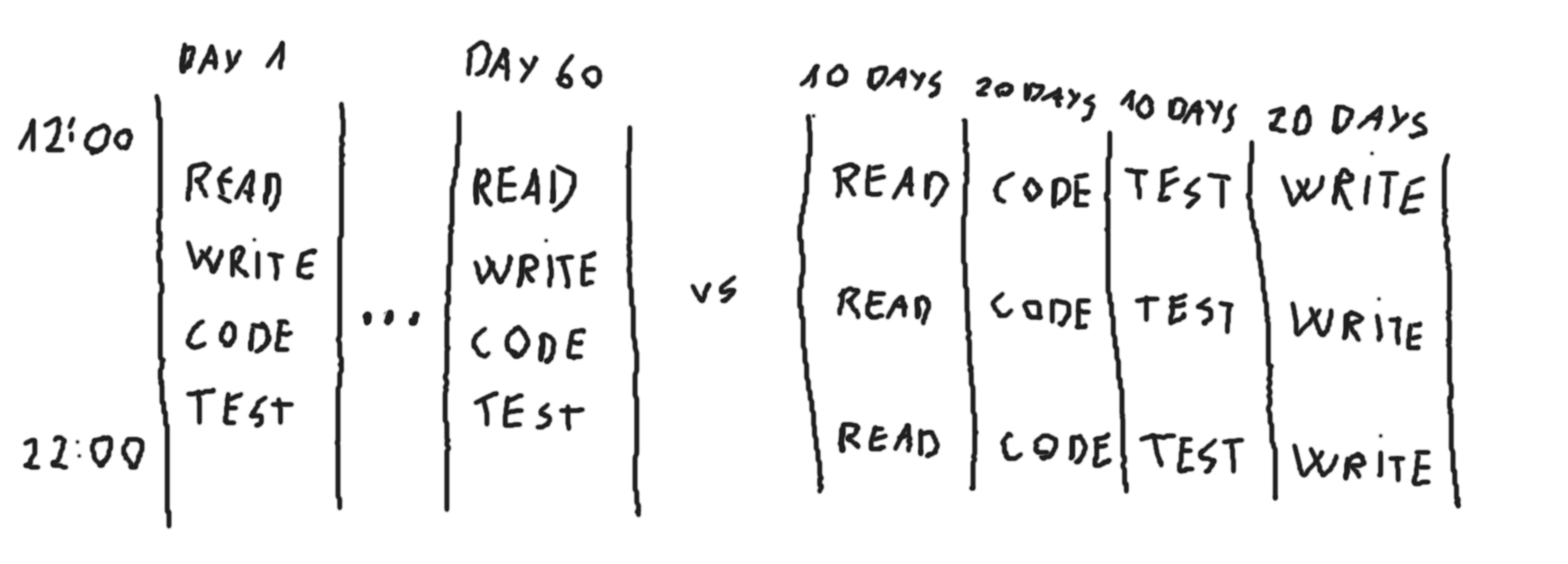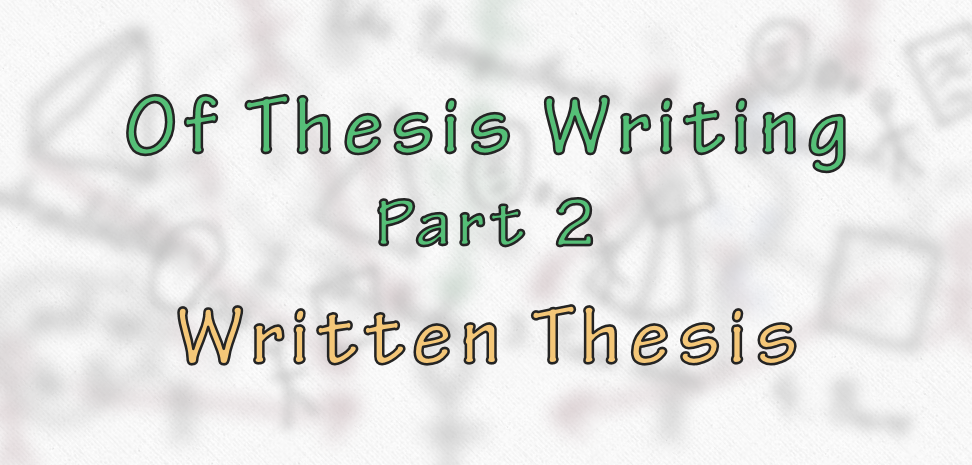You might be wondering why do you have to write a thesis. Would it not be sufficient just to create something novel that illustrates your exploration by itself.
Why is a Thesis Written?
First there are two purposes to write something down: formulation and communication. By formulating your information you create a systematic way to understand it. You weave kind of a narrative: first you describe the state of the world and indicate the problem, next you describe your attempts to overcome that problem, lastly you find a solution and conclude with an improved world state. In other terms you identify the unknown, explore into it, then create a map based on your adventures. If you were to just show the result without describing your journey to it, then you show everyone B without telling them how to get to B from A. That is kind of half the work. You describe a paradise without explaining to anyone how to get there. So the written part of your thesis needs to serve as a map to others wanting to achieve the same result. This creates certain conditions on how you need to formulate your journey so that the formulation facilitates useful communication.
 Secondly we can think about the quality of your map. Perhaps you took a longer path to B than necessary. Perhaps you did not actually make it to B, but ended up in a very similar B’. Because you formulated your journey, other explorers can critically analyze your path and perhaps create even better maps out of it. Maybe you also used some neat trick to overcome an obstacle in your path. Trick you came up with and can now be used in other situations, because you formulated it.
Secondly we can think about the quality of your map. Perhaps you took a longer path to B than necessary. Perhaps you did not actually make it to B, but ended up in a very similar B’. Because you formulated your journey, other explorers can critically analyze your path and perhaps create even better maps out of it. Maybe you also used some neat trick to overcome an obstacle in your path. Trick you came up with and can now be used in other situations, because you formulated it.
 In a more broader sense you can think back to the statement that a scientific degree specifies your skill as an explorer and navigator. Being able to concisely and helpfully write up your journeys is a very important aspect to being an explorer. You do not want to be a vagabond or a nomad in your life.
In a more broader sense you can think back to the statement that a scientific degree specifies your skill as an explorer and navigator. Being able to concisely and helpfully write up your journeys is a very important aspect to being an explorer. You do not want to be a vagabond or a nomad in your life.
How is a Thesis Written?
Like it is already mentioned many times, your thesis should be able to serve as a kind of a map. You can think of your thesis as a narrative with a start, journey and an end. Besides that you should also make sure your thesis actually carries something useful. Your starting point should be accessible to many people. It should be something that exists in the metaphysical world, a place with an interesting problem. It does not have to be a dread catastrophe like world hunger or climate change. Your problem could very well be stated in the spirit of doing a known thing in a better way. Or even of doing an unknown thing in some way and showing that it is beneficial to do that specified thing.
This kind of a problem statement should be prominent in all the levels of your thesis. The thesis as a whole should create the narrative around the statement. Chapters need to explore the key partitions of that narrative, including different perspectives of the problem and process of its solution. Paragraphs then create sub-narratives in the chapters and so on. For example if you would write a thesis about a pyramid, then each chapter could be about the different geometrical perspective one could have of a pyramid.
 Or a less abstract way of thinking about it would be to describe:
Or a less abstract way of thinking about it would be to describe:
- Why do people need your pyramid? – Vision & Background
- What does your pyramid consists of? – Goals
- How did you built the pyramid? – Methods
- Is the construction solid? – Validation
- How does it look like from space? – Future
There are many techniques how to write something. The most important recommendation I have is to remember that text in a computer is not set in stone. You can and really should be your own editor. You want to avoid the situation, when you write something because of sheer pressure, never look at it and then justify: “this is what I came up with.” On the other hand you also want to avoid the situation, when you spend weeks stuck at a single paragraph. Getting to 100% perfect paragraph might take you twice the amount of getting to 80% good paragraph, and 80% is certainly better than 0%. Best way to try to balance that seems to be to write whatever comes to your mind at a given topic and then iteratively read and edit it a couple of times. Once when you are done writing, then about a couple of days later and maybe even once several weeks later. The added benefit of this is that then you also remember what you actually wrote. That will give you a better foundation to defend your writings and answer to questions about it generally on the fly.
 The way people write seems to depend on many personal factors. Thus it is up to you to find out what way of writing suits you the best. The goal is for you to develop your own style, which gets you the results you want.
The way people write seems to depend on many personal factors. Thus it is up to you to find out what way of writing suits you the best. The goal is for you to develop your own style, which gets you the results you want.
There are two approaches to writing I have generally noticed:
- Writing about 0.5 – 1 page in a day. That seems to be suitable for people, who have a hard time at writing. It is not overly much if you are not used to it, but still creates a good flow in order to complete your thesis in time.
- Writing about 10 pages in a day. The idea here is that a person spends weeks or more to thoroughly think about the formulation of their ideas before actually writing anything but notes. Basically they are writing very loosely in their heads before sitting down and then writing like there is no end. Probably not very suitable for people who do not like writing or can not envision themselves writing that much in a day.
Note also that those time estimates are for writing only. These do not involve editing the text (ie rephrasing, restructuring, corrections etc) or reading and understanding the reference material. So please try to plan everything out in a way that you have the time to do everything you want.
 At times you might find yourself in a position where you have nothing to write. That generally seems to be an indication that you have either not thought the journey through yet or are unsure of your results. For the first case you should try to think about the narrative of your thesis: What is the problem? How are you tackling it? What results did you get? For the second case when you are unsure, it seems that reading different other material and establishing solid connections between your work and others’ work can help with that. Of course there could also be a third issue that you do not know how to write down your actual discoveries. But in that case you do have that something to write and this is a more tangible problem you can solve with your supervisor.
At times you might find yourself in a position where you have nothing to write. That generally seems to be an indication that you have either not thought the journey through yet or are unsure of your results. For the first case you should try to think about the narrative of your thesis: What is the problem? How are you tackling it? What results did you get? For the second case when you are unsure, it seems that reading different other material and establishing solid connections between your work and others’ work can help with that. Of course there could also be a third issue that you do not know how to write down your actual discoveries. But in that case you do have that something to write and this is a more tangible problem you can solve with your supervisor.

Before planning your writing you should establish the thesis goals. Those will depend largely on the type of a thesis about which you can read more in the next chapter Types of a Thesis.



